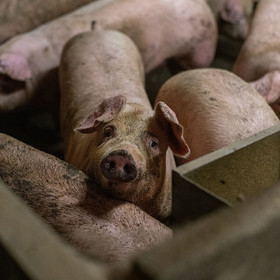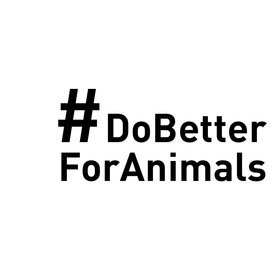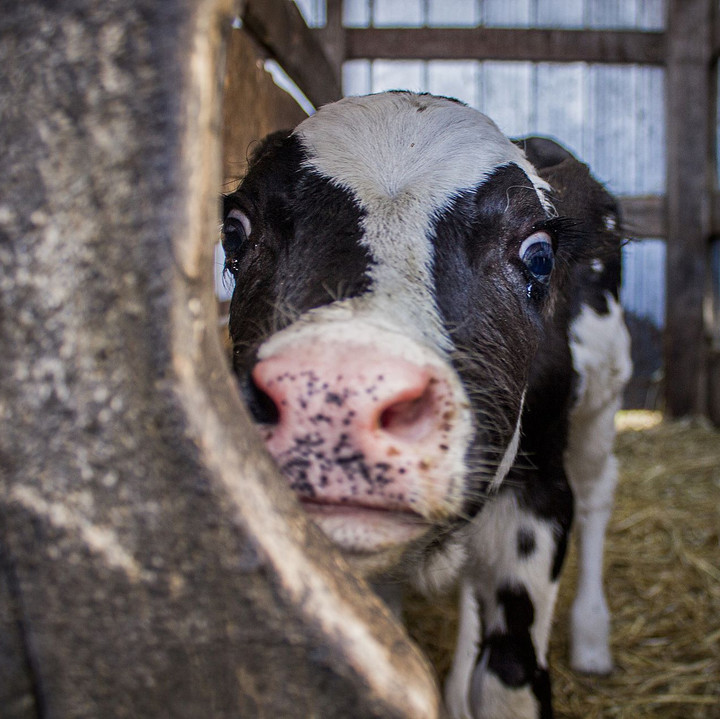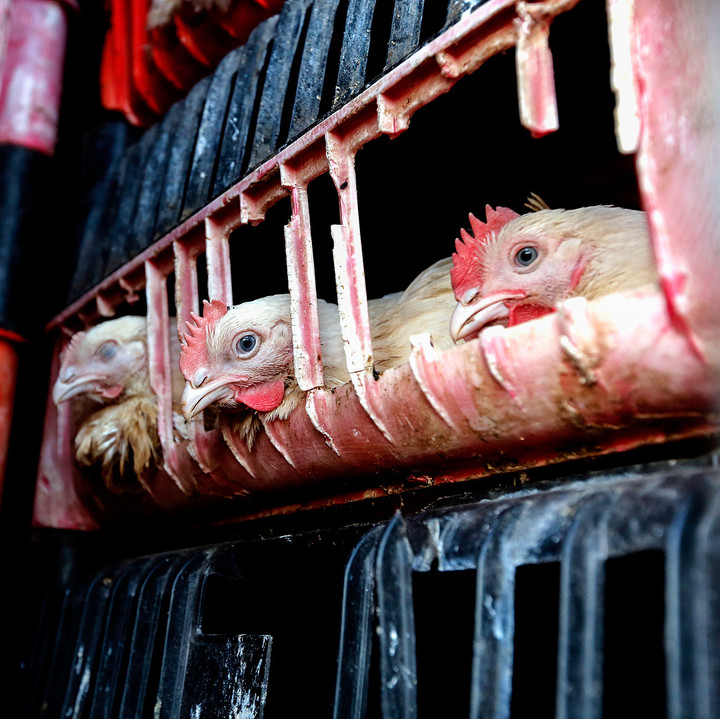Reforming Animal Welfare Legislation
We currently face a unique crossroad where we can change the story of billions of animals.
Every year within the European Union, billions of so-called livestock spend their whole lives in cages, subject to painful mutilations and poor keeping conditions, then transported across borders within the EU and to third countries and slaughtered in ways that cause intense suffering.
We now have a huge opportunity to raise animal welfare standards at European level. Over the past years, there has been promise after promise that major animal welfare legislations within the EU would be revised starting in 2023. Despite much anticipation, the EU Commission only went ahead with just one of the four promised farm animal legislative proposals on animal welfare, which will be on live animal transport.
The other legislations on hold are kept and slaughtered in the European Union how animal products are labelled. This delay in the revision is a missed opportunity not only for the lives of animals within the EU, but due to the 'Brussels Effect', these laws significantly influence the lives of billions of animals suffering in farming systems across the globe!
With the EU elections now behind us, and a new Parliament formed, it is essential that EU lawmakers truly commit to a better and more animal-friendly EU – they must stick to their promises and commitments to European citizens and revise these legislations. We are working thoroughly to ensure that these changes are going ahead.


What European laws are going to be revised?

The Transport Regulation

The General Farm Animal Directive

The Slaughter Regulation

Animal Welfare Labelling Regulation
What are these EU animal welfare legislations and why do they need to be revised?
In 2020, the EU Farm to Fork Strategy outlined a vision for the future of the agri-food sector in the European Union. There are several EU farm animal welfare legislations, with three major legislations currently being looked at, these are:
- The General Farm Animal Directive (Council Directive 98/58/EC)
- The Transport Regulation (Council Regulation (EC) No 1/2005)
- The Slaughter Regulation (Council Regulation (EC) No 1099/2009)
Each of these current legislations is far outdated and is severely lacking behind the latest science of animal behaviour and physiological needs. This means farm animals are not being properly legally protected throughout the European Union or the rest of the world. The conditions under which animals are farmed, transported and slaughtered vary significantly across the EU and rules are often breached due to poor enforcement. Over the years, as EU citizens' expectations have increased, millions are now demanding better animal welfare within the European Union. An astonishing 84% of Europeans believe that the welfare of farmed animals in their country should be better protected and 83% of respondents to the latest Eurobarometer survey support limiting transport time of live animals within or from the EU.
Policymakers are seeing the demand and need to keep up with today's science, and now it’s time to ensure that these legislations are based on the latest scientific evidence. Despite promises to its citizens, the European Commission failed to publish all the promised proposals within the last legislative term. The revision of the Transport Regulation was the only one of the four promised proposals published in 2023.
How can European legislation also change the lives of billions of animals across the globe?
The European Union takes the lead on rulemaking, and European values have a broad appeal. Therefore, regulations drafted within the EU shape the global market as other countries very often adopt EU rules and regulations. For farm animals, this means that adaptions to these legislations could strongly influence the adaptions and development of rules of how farm animals are kept, transported and slaughtered around the globe. These decisions will significantly influence the lives of billions of animals suffering in farming systems across the globe for many years to come.
The Transport Regulation (Council Regulation (EC) No 1/2005)
After spending their entire lives in intensive keeping systems, or even before being weaned from their mothers, billions of animals undergo terrifying journeys. These individuals are transported for up to several days and weeks in disastrous conditions across borders within the EU and to third countries. The Transport Regulation has been in force since 2007. However, this regulation fails to protect the billions of animals being transported within and out of the European Union every single year. Investigations and independent reports show us that animals suffer considerably on these journeys, routine breaches of the already lax legislation result in the dire suffering of billions of animals annually.
Over the past decades, FOUR PAWS have been working intensively to change the existing legislation and to achieve an end to long-distance live animal transports and exports to third countries. The past years have been strong for the transport campaign #StopTheTrucks, as our supporters called on the European Union to move the system, not the animals.
In December 2023, the European Commission finally announced the suggested changes for the revision of the Transport regulation. Despite it being the lone revision affecting farmed animals out of four promised, it lacks the bold ambition needed to address the significant pitfalls in animal welfare. Now it is decision time, as the other EU Institutions, namely the EU Parliament and the Council of the EU, will make amendments to the proposal before it becomes the law.
We demand to see a ban on cruel live animal transport is included in the amendments. We need shorter transport times and species-specific transport requirements. Instead of undergoing a traumatic export, only the transport of meat and carcasses as well as genetic material should be allowed.
The General Farm Animal Directive (Council Directive 98/58/EC)
The General Farm Animal Directive was adopted in 1998 and dictates how farmed animals are kept within the European Union. In 2020 alone, there were 146 million pigs, 76 million bovine animals and 75 million sheep and goats in our farming systems. Furthermore, 13.6 million tonnes of poultry meat were produced. The vast majority of these animals are kept in intensive systems without outdoor access. Millions of animals are kept in cages and subjected to cruel and painful mutilations, without even their basic needs being met. Over the past years, our joint European Citizens' Initiative #EndTheCageAge urged the European Commission to commit to placing a ban on cage systems in farming. As the proposal was not released this term, we need to see an animal welfare strong new EU Parliament elected in 2024. Now, as the revision process is ongoing, we must ensure that the new legislation will indeed bring cage keeping to an end and go beyond this by establishing high standards for animal welfare in farming and setting a framework for an EU farm animal welfare legislation that is based on the Five Domains model.
The Slaughter Regulation (Council Regulation (EC) No 1099/2009)
As long as animals are kept for human consumption, requirements on slaughter cannot be neglected as they have significant implications for animal welfare. With at least 8.4 billion farm animals being slaughtered every year within the European Union, it is essential that these animals are protected as well in their last moments.
Many stunning methods in the European Union used before slaughter, such as water bath stunning for poultry and CO2 for pigs stunning, have severe negative effects on welfare. Many animals are slaughtered without being sufficiently stunned or suffer from inappropriate stunning resulting in immense stress and pain in their last moments.
With such large numbers of animals being slaughtered and processed at these facilities, workers are under time pressure, which means violations become 'common practice', causing major animal welfare issues. As a result, the methods of how animals are killed not only need to be revised, the system must also provide better monitoring so that the legal handling of animals cannot be broken. The revised legislation should see all slaughterhouses equipped with CCTV monitoring – and violations must be punishable by law.
The Animal Welfare Labelling Legislation
In order for consumers to make informed and better choices about the animal products they purchase, they must have transparency in terms of animal products being labelled.
Right now, the EU only has one mandatory welfare label, and that’s on eggs. Currently, consumers are provided with little to no information, which are based on many factors about how that animal was bred, raised, transported or slaughtered, or a multitude of confusing private labels that promise animal welfare – and thus consumers are likely to purchase lower-priced animal products which are usually linked with many animal welfare issues.
With raised awareness, European Union citizens are becoming more awake to the terrible cruelty of animals in industrialised farming systems and want to know how to make better choices. A common animal welfare label throughout the European Union could mean that all animal products would have to be marked on the product packaging with better information of the animal's life and keeping conditions.
Ideally, a label should cover the welfare of the animal from birth to death and ensure traceability along the whole production chain. Having a food labelling system across the European countries will drive the market towards more animal welfare-friendly products, which will also encourage farmers to transition from age-old methods where animals suffer to better animal-keeping husbandry and farming methods.
How can you help to rewrite the system to #DoBetterForAnimals?
Our actions today influence their decisions tomorrow – and so we need the help of our supporters to make sure that the welfare of billions of animals is put at the top priority of the legislation revision. Our European Institutions and policymakers are heavily influenced by the demands of their citizens, but legislative processes at EU level can be complex and difficult to follow for the public. Stay tuned with the processes here.
Note: Any advertisements that may appear during the viewing of this video are unrelated to FOUR PAWS. We assume no liability for this content.


